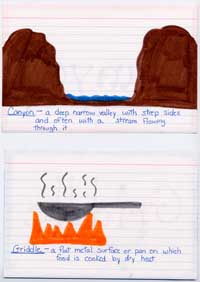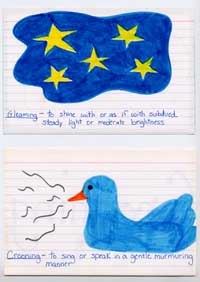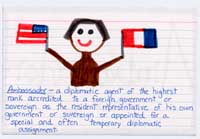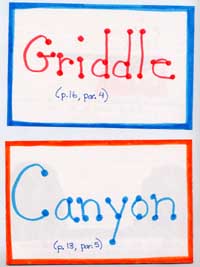
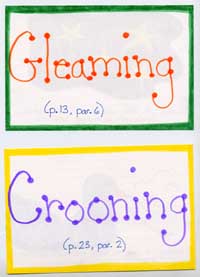
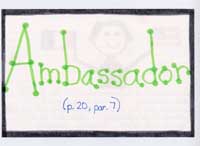
Tall Tales
Lara Seagle, Louise Urban,
Kristy Familar, Jessica Coulter
Word Wizard
Griddle:
(my definition)—an appliance to cook on; similar to a frying pan
(dictionary)— a flat metal surface or pan on which food is cooked by dry heat
“When everything was ready, with the flames under the griddle blazing like a forest fire, Paul picked out a crew of men who could stand the heat
better than others.” (p. 16, par. 4)
My sentence: I use a griddle to cook my pancakes in the morning before I go to school.
This word adds meaning to the story because it gives the reader a way to conceptualize what the pan is. It is a much more descriptive word than
simply “pan”, or another more general word.
Part of Speech: noun
Canyon:
(my definition)—similar to a valley or any sort of deep indention in the land
(dictionary)— a deep narrow valley with steep sides and often with a stream flowing through it
“They massed up together in purple canyons and shoved each other out of the way on the shores of lakes.” (p. 13, par.5)
My sentence: Instead of camping on the top of a tall mountain, we decided to set up our tents in the nearby canyon.
This word adds meaning to the story because it allows the reader to learn more about the setting and story environment.
Part of Speech: noun
Gleaming:
(my definition)—to sparkle or to shine
(dictionary)— to shine with or as if with subdued steady light or moderate brightness
“He loved the smell of wood when it was cut and the look of its sap gleaming like honey.” (p.13, par. 6)
My sentence: When I was out in the moonlight last night, my best friend said that she could see my eyes gleaming brightly.
This word adds meaning to the story because it describes how the sap looked when Paul cut the trees down. The sap gleamed like honey, which
means that it shined and sparkled just like honey. This is a good description for the reader to visualize because it gives you a mental picture of
how plentiful and heavily the sap ran. It is also a word with a positive connotation, and that helps the reader see how Paul thought fondly of the
trees.
Part of Speech: adjective
Ambassador:
(my definition)—a person who is in another country that is representing the government and laws of their own country
(dictionary)— a diplomatic agent of the highest rank accredited to a foreign government or sovereign as the resident representative of his own
government or sovereign or appointed for a special and often temporary diplomatic assignment
“The Swedish ambassador’s false teeth jumped out of his mouth and started biting the ground in excitement.” (p. 20, par. 7)
My sentence: The United States ambassador to England helped solve some of our trading problems.
This word adds meaning to the story by simply explaining who the person in the story is. The fact that the word “ambassador” appears in the story
alerts readers that this is an important person with some kind of rank.
Part of Speech: noun
Crooning:
(my definition)—to speak softly and intimately
(dictionary)— to sing or speak in a gentle murmuring manner
“Yes, sir, Babe, old friend,” said Paul on one of those starlit nights with the wind crooning in the sugar pines, “it’s too good a life to leave.” (p.23, par. 2)
My sentence: During the most romantic evening of my life, my boyfriend crooned to me that he wanted me to be his wife.
This word adds meaning to the story because it shows how the wind was “speaking” to Paul. It sets the mood of the passage by using a descriptive
word such as this. It gives the reader a sense of peace and calmness.
Part of Speech: verb
Examples of Word Wizard Cards:



